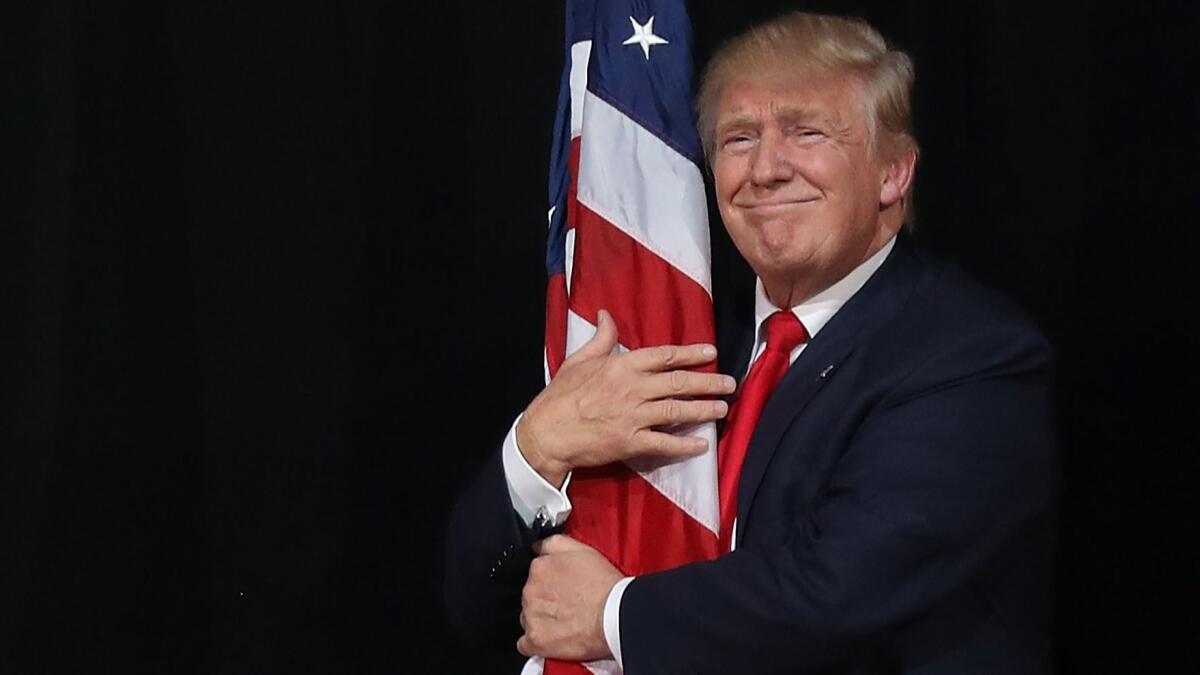Even if Trump loses, Trumpism may outlast him

- Share via
WASHINGTON — Even if President Trump loses reelection, evidence is growing that his populist, personality-driven movement will continue to dominate the Republican Party, overpowering conservatives who are trying to sketch out alternatives.
The clearest signs can be seen among the Trump acolytes making early moves to win the 2024 Republican nomination.
South Dakota Gov. Kristi Noem, who spoke in New Hampshire last week, has been getting advice from Corey Lewandowski, Trump’s former campaign manager.
Michael R. Pompeo delivered a blistering attack against China, Trump’s favorite foreign punching bag, at a speech to the Wisconsin state Legislature last month, one of many eyebrow-raising turns toward domestic politics for the secretary of State.
Nikki Haley, Trump’s former United Nations ambassador, this week put her endorsement behind a candidate for governor of Montana who is best known for body-slamming a reporter.
“People are laying the groundwork to consolidate that Trump base,” said Amanda Carpenter, a Republican Trump critic and former advisor to Texas Sen. Ted Cruz, another would-be successor. “Even with a big loss, he will still be the kingmaker of the Republican Party in many senses.”
As the presidential election nears, Democrats and Republicans are targeting Florida’s other Latino voters, not just Cuban Americans and Puerto Ricans.
The prospect seemed unthinkable in 2016, when Trump was an establishment pariah beating back attempts to prevent him from securing the nomination, and then later in the year staving off defections only days before the general election.
Even more recently, several Republican senators in tight elections have tried to distance themselves from Trump as his electoral prospects have dimmed.
But Trump remains the most popular figure in his party and even if he loses is unlikely to keep quiet in future primary races up and down the ballot, including in red states and districts where candidates have little incentive to moderate.
Candidates have seen that Trump’s grievance-based rhetoric, which spread in the tea party movement that preceded him, holds sway over a large segment of Republican voters who feel marginalized or ignored amid the country’s social and economic changes.
“There’s money behind it now, and not only is there money, there is established media,” said Lawrence Rosenthal, chair of the Berkeley Center for Right-Wing Studies and author of “Empire of Resentment: Populism’s Toxic Embrace of Nationalism.”
“Something like Fox News can veer into the next pretty face,” he added. “Breitbart is not going away.”
Rosenthal argues that American conservatism is now linked to populist movements in Europe and elsewhere, filling in an ideology around Trump’s persona.
The issues on which Trump has changed Republican Party orthodoxy — strict limits on immigration, hostility to trade deals, isolationist foreign policy, ignoring big budget deficits — have been largely popular with the Republican base. His style of grievance, white-identity politics and determination to destroy institutions has been accepted by leading Republicans and celebrated by his most loyal supporters.
“Elements of the right are trying to lend intellectual credibility to the president’s thinking” as conservatives debate whether the party should embrace a government that is bigger and intervenes more in financial markets, said Lanhee J. Chen, who served as policy director for Utah Sen. Mitt Romney’s presidential campaigns.
“Some of the dialogue is very much warranted,” he added. “Some of it seems like you’re trying to twist yourself into a pretzel to make something seem conservative, when, in fact, at core it isn’t.”
But Trump’s level of influence depends on a variety of still-unknown factors, including the results of the election. A win, of course, would make Trumpism stronger. But even a close loss, especially one in which his supporters can blame a rigged election, could prolong his influence.
A bigger defeat could shrink his sway.
Not all observers think the movement could survive the loss of its leader.
“The movement consists of Trump!” said Ruth Wodak, an Austrian linguist who has written extensively about European right-wing populism.
Wodak hesitates to make a prediction but argues that “without the leading figure,” many in the party will try to distance themselves “from both style and some unconstitutional and undemocratic practices and policies.”
“People tend not to want to associate with losers, as the president likes to tell us,” said Henry Olsen, author of “the Working Class Republican.”
“If he loses by a big margin, he’ll be a capital-L loser.”
Olsen, however, argues that there is more to Trump than “the soft personality cult.”
Republicans who lack Trump’s bombast but are close to him in other ways, including Sen. Tom Cotton of Arkansas and Vice President Mike Pence, will have to decide how to position themselves as Trump’s successors, addressing concerns of religious conservatives and other groups that feel disaffected.
Much will also depend on how former Vice President Joe Biden, if he wins the election, chooses to govern. If he sides with Democratic liberal populists, he could drive a wedge into Trump’s coalition but would also risk losing some of the less populist parts of his party. If he embraces a moderate agenda, he could lose claims to populism but may also squeeze out Republicans’ ability to attack him.
Trump is “in many ways a sui generis personality,” said Whit Ayres, a Republican pollster. “There are not a lot of Donald Trumps out there. That doesn’t mean the populist movement and the anger he tapped into is going away.”
Some Republicans are grasping for a way forward that fuses prior Republican principles, including more engagement in foreign policy, with an appeal to working-class voters who flocked to Trump.
Florida Sen. Marco Rubio, one of Ayres’ clients, has preached something called “common good capitalism,” which argues that corporations have as much obligation to their workers as to shareholders.
Former Arizona Sen. Jeff Flake, one of the first elected Republicans to break from Trump while still in office, said the party needs to find a coherent agenda that goes beyond “anger and resentment masquerading as a governing philosophy.”
He believes a loss could force that discussion. Yet he worries that if the loss is too big — and Republicans lose control of the Senate as well as the White House — they will become an opposition party with no incentive to govern.
“You have to find a way to appeal based on some kind of principles,” Flake said. “Not just ‘own the libs.’”
More to Read
Get the L.A. Times Politics newsletter
Deeply reported insights into legislation, politics and policy from Sacramento, Washington and beyond. In your inbox twice per week.
You may occasionally receive promotional content from the Los Angeles Times.












